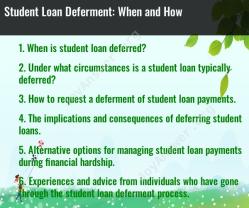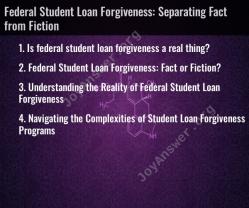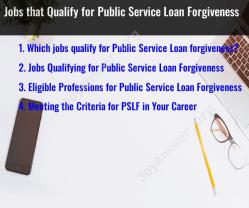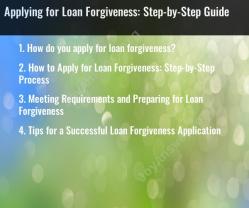Should you refinance or wait for student loan forgiveness?
Deciding whether to refinance your student loans or wait for student loan forgiveness depends on various factors, including your financial situation, loan types, career path, and personal goals. Here are some key factors to consider when making this decision:
1. Loan Types: Consider the types of loans you have. Federal student loans offer more flexible repayment options, including income-driven plans, and the potential for forgiveness. Private loans typically do not offer the same borrower protections. If you have private loans, you won't be eligible for federal loan forgiveness programs, but you can still refinance to potentially get a lower interest rate.
2. Financial Stability: Assess your current financial stability. If you have a stable income and can comfortably manage your loan payments, refinancing may be an option to lower your interest rates and potentially save money over the life of the loan.
3. Career Path: Your career path can significantly impact your decision. If you work in a public service job and plan to continue for the long term, waiting for Public Service Loan Forgiveness (PSLF) may make sense. Other forgiveness programs, like Teacher Loan Forgiveness, may apply if you're in a specific profession. However, if you're in a high-earning field and don't anticipate loan forgiveness benefits, refinancing may be more appealing.
4. Forgiveness Program Eligibility: Carefully review the eligibility criteria for the loan forgiveness programs you're considering. Make sure you meet the requirements and can stay eligible for the duration of the forgiveness process.
5. Loan Amount: The total amount of your student loans matters. If you have a relatively small loan balance, you may choose to refinance and pay off the debt more quickly rather than waiting for forgiveness, especially if your interest rates are high.
6. Interest Rates: Compare your current interest rates with what you could potentially get through refinancing. If you can secure a lower interest rate, it may make refinancing more appealing. Keep in mind that if you refinance federal loans, you'll lose federal borrower protections, such as income-driven repayment options.
7. Long-Term Financial Goals: Consider your long-term financial goals. If you're focused on paying off your loans quickly and reducing interest costs, refinancing may be a good option. If you prioritize loan forgiveness and have a long-term perspective, waiting for a forgiveness program may be the better choice.
8. Tax Implications: Understand the potential tax consequences of forgiveness. For some forgiveness programs, the forgiven amount may be considered taxable income, which can have significant tax implications. This is a critical factor to consider in your decision.
9. Monthly Payment Preferences: Consider your preference for monthly loan payments. If you want to minimize your monthly payments, income-driven repayment plans under federal loans can be more accommodating. Refinancing may result in higher monthly payments but potentially lower overall interest costs.
In summary, the decision to refinance or wait for student loan forgiveness is highly individual and depends on your specific circumstances and financial goals. It's essential to thoroughly research and compare your options, possibly consult with a financial advisor or student loan expert, and make an informed decision that aligns with your financial well-being and future plans. Keep in mind that the best decision for one person may not be the best for another, so carefully assess your own situation.
Pros and Cons of Refinancing Student Loans
Refinancing student loans can be a beneficial option for borrowers seeking to lower their interest rates, simplify their repayment plans, or consolidate multiple loans into a single one. However, it's crucial to carefully consider both the potential advantages and drawbacks before making a decision.
Pros:
Lower interest rates: Refinancing can potentially lead to lower interest rates, which can significantly reduce the overall cost of borrowing.
Reduced monthly payments: Lower interest rates can translate into lower monthly payments, making it easier to manage your debt.
Simplified repayment: Refinancing multiple loans into a single one can simplify your repayment process and make it easier to track your progress.
Potential for loan forgiveness: Some private lenders offer loan forgiveness programs for borrowers who meet certain criteria, such as working in a specific field or making consistent on-time payments.
Cons:
Loss of federal loan benefits: Refinancing federal student loans into a private loan means losing access to federal benefits, such as income-driven repayment plans, loan forgiveness programs, and deferment or forbearance options.
Potential for higher interest rates: Refinancing to a private lender may result in higher interest rates, especially if your credit score has not improved significantly since taking out the original loans.
Prepayment penalties: Some private lenders may charge prepayment penalties if you pay off your loan early, which can offset any savings from refinancing.
No fixed interest rates: Most private student loans have variable interest rates, which means your payments may fluctuate based on market conditions.
Weighing the Decision to Refinance or Wait for Loan Forgiveness
The decision to refinance or wait for loan forgiveness depends on your individual circumstances and financial goals. Consider the following factors:
Your current interest rate: If your current interest rate is significantly higher than current refinancing rates, refinancing could save you money.
Your eligibility for loan forgiveness: If you are eligible for federal loan forgiveness programs, such as Public Service Loan Forgiveness (PSLF) or Teacher Loan Forgiveness, refinancing may not be the best option.
Your credit score: Your credit score will influence the interest rates you are offered when refinancing. If your credit score has improved since taking out the original loans, you may be able to secure lower interest rates.
Your financial stability: If your income is stable and you can afford to make higher monthly payments, refinancing could help you pay off your loans faster.
Understanding Student Loan Forgiveness Programs
There are several student loan forgiveness programs available to borrowers who meet specific criteria. These programs can provide relief to borrowers who are struggling to repay their loans and make higher education more accessible.
Common Student Loan Forgiveness Programs:
Public Service Loan Forgiveness (PSLF): PSLF forgives the remaining balance on federal Direct Loans for borrowers who work full-time for qualifying public service organizations, such as government agencies or non-profit organizations, and make 120 on-time payments.
Teacher Loan Forgiveness: Teacher Loan Forgiveness forgives up to $17,500 in federal Direct or FFEL Loans for teachers who work for five consecutive years in a low-income school or educational service agency.
Income-Driven Repayment (IDR) Loan Forgiveness: Under IDR plans, borrowers make payments based on their income and family size. After 20 or 25 years of payments, the remaining balance on the loans may be forgiven.
Total and Permanent Disability (TPD) Discharge: Borrowers who become totally and permanently disabled may qualify for loan forgiveness through the TPD discharge.
Tips for Maximizing Student Loan Forgiveness Benefits
If you are considering pursuing student loan forgiveness, here are some tips to maximize your benefits:
Understand the eligibility requirements: Carefully review the eligibility criteria for each program to ensure you meet the qualifications.
Make on-time payments: Consistent on-time payments are crucial for qualifying for most loan forgiveness programs.
Document your employment and service: Keep detailed records of your employment and service history to support your eligibility claims.
Stay informed about program changes: Forgiveness programs may be subject to changes, so stay informed about any updates or modifications.
How to Calculate Potential Savings with Loan Refinancing
There are several online tools and calculators available to help you estimate the potential savings from refinancing your student loans. These calculators can factor in your current interest rates, loan balances, and potential refinancing rates to provide an estimate of your monthly savings and overall cost savings.
Here are some steps on how to calculate potential savings with loan refinancing:
Gather your loan information: Collect information about your current student loans, including the loan amounts, interest rates, and remaining balances.
Estimate refinancing rates: Check with various lenders to get estimates for refinancing rates based on your credit score and financial profile








